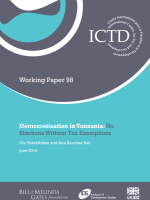Democracy is expensive in poor African countries – very expensive
In poor African countries, clientelism and corruption are often amplified by democratisation. Political parties typically depend on money from companies and rich individuals to finance their election campaigns, because their own incomes and government party subsidies are insufficient. In exchange, the ruling party in government typically gives companies and richer individuals tax exemptions and other rents.
These tax exemptions cause significant revenue losses in African countries, In 2010/2011 they amounted to 2,5 percent of GDP for Tanzania; 7,1 percent for Burundi, 2,6 percent for Kenya; and 1,2 percent for Uganda. Tanzania’s revenue losses from tax exemptions are therefore typical.
This working paper shows that in Tanzania the volume of tax exemptions to companies and individuals – and hence revenue losses – peaked around each of the four election years between 2000 and 2015. During that period election campaigns became ever more expensive.
Thus, political and economic liberalisation since the 1990s have forged links of direct mutual interests and dependency between ruling parties and parts of the private sector. Especially larger domestic companies donate money to the ruling party in exchange for firm-specific tax exemptions, licences and permits that opposition parties cannot deliver. These exchanges are typically not transparent. In such cases, political financing distorts democratisation and governance.
Democratisation in Tanzania: No Elections Without Tax Exemptionsis published by the International Centre for Tax and Development (ICTD).
DIIS Experts


